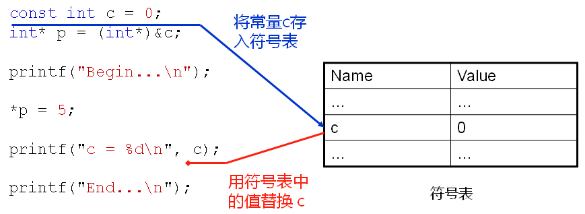C++解析(2):进化后的 const 分析
0.目录
1.C语言中的const
2.C++中的const
3.对比
- 3.1 C语言与C++中的const
- 3.2 C++中的const与宏定义
4.小结
1.C语言中的const
- const修饰的变量是只读的,本质还是变量
- const修饰的局部变量在栈上分配空间
- const修饰的全局变量在只读存储区分配空间
- const只在编译期有用,在运行期无用
也就是说:const修饰的变量不是真的常量,它只是告诉编译器该变量不能出现在赋值符号的左边。
(如果我们修改了const修饰的全局变量,那么程序将产生一个崩溃,因为我们修改了只读存储区里面的内容,那么大多数编译器所编译出来的可执行程序都会发生崩溃的。)
- C语言中的const使得变量具有只读属性
- const将具有全局生命周期的变量存储于只读存储区
综上,const不能定义真正意义上的常量!
(面试题:在C语言里面,你有办法定义真正的常量吗?
如果回答:可以,用const。//C语言一般
因为在C语言里面只有通过enum来定义的这些标识符才是真正意义上的常量,也就是说,C语言里面真正意义上的常量只有枚举。const只不过说使得变量具有了只读属性而已,它并不能定义真正意义上的常量。)
那么C++中的const到底有什么改变呢?
这是test.c代码:
// test.c
#include <stdio.h>
int main()
{
const int c = 0;
int* p = (int*)&c;
printf("Begin...\n");
*p = 5;
printf("c = %d\n", c);
printf("*p = %d\n", *p);
printf("End...\n");
return 0;
}
这是test.cpp代码:
// test.cpp
#include <stdio.h>
int main()
{
const int c = 0;
int* p = (int*)&c;
printf("Begin...\n");
*p = 5;
printf("c = %d\n", c);
printf("*p = %d\n", *p);
printf("End...\n");
return 0;
}
分别用gcc编译器和g++编译器运行程序结果如下:
[root@bogon Desktop]# gcc test.c
[root@bogon Desktop]# ./a.out
Begin...
c = 5
*p = 5
End...
[root@bogon Desktop]# g++ test.cpp
[root@bogon Desktop]# ./a.out
Begin...
c = 0
*p = 5
End...
2.C++中的const
C++在C的基础上对const进行了进化处理:
-
当碰见const声明时在符号表中放入常量
-
编译过程中若发现使用常量则直接以符号表中的值替换
-
编译过程中若发现下述情况则给对应的常量分配存储空间:
- 对const常量使用了extern
- 对const常量使用&操作符
注意:C++编译器虽然可能为const常量分配空间,但不会使用其存储空间中的值。
(为什么会有这种行为?这是为了兼容C语言。兼容的意思是说,之前能用C语言编译器编译的程序,用C++编译器也要能编译通过。只不过说编译通过了以后,可能可执行程序运行的结果会有所不同。)

(符号表就是编译器在编译的过程当中所产生的一张表,这张表是编译器内部的数据结构,也就是说,编译器在编译程序的时候会产生各种各样的数据结构,这些内部的数据结构里面就有一个叫做符号表。)
3.对比
3.1 C语言与C++中的const
C语言中const变量是只读变量,会分配存储空间。
C++中的const可能分配存储空间:
- 当const变量为全局,并且需要在其它文件中使用
- 当使用&操作符对const常量取地址
这是test.c代码:
// test.c
#include <stdio.h>
void f()
{
#define a 3
const int b = 4;
}
void g()
{
printf("a = %d\n", a);
//printf("b = %d\n", b);
}
int main()
{
const int A = 1;
const int B = 2;
int array[A + B] = {0};
int i = 0;
for(i=0; i<(A + B); i++)
{
printf("array[%d] = %d\n", i, array[i]);
}
f();
g();
return 0;
}
这是test.cpp代码:
// test.cpp
#include <stdio.h>
void f()
{
#define a 3
const int b = 4;
}
void g()
{
printf("a = %d\n", a);
//printf("b = %d\n", b);
}
int main()
{
const int A = 1;
const int B = 2;
int array[A + B] = {0};
int i = 0;
for(i=0; i<(A + B); i++)
{
printf("array[%d] = %d\n", i, array[i]);
}
f();
g();
return 0;
}
分别用gcc编译器和g++编译器运行程序结果如下:
[root@bogon Desktop]# g++ test.cpp
[root@bogon Desktop]# gcc test.c
test.c: In function ‘main’:
test.c:20: error: variable-sized object may not be initialized
test.c:20: warning: excess elements in array initializer
test.c:20: warning: (near initialization for ‘array’)
- C语言编译器不能编译通过,20行会报错。因为定义数组array,需要知道数组的大小,而数组的大小A+B是由两个只读变量相加得到的。两个变量相加的结果需要到运行时才知道,因此编译器不乐意了,编译器根本不知道数组大小,所以直接报错。
- C++编译器直接编译通过。因为数组大小是由两个真正意义上的常量A和B来完成的。这时候编译器编译到这个地方,显然知道数组的大小是3。
3.2 C++中的const与宏定义
C++中的const常量类似于宏定义:
const int c = 5; ≈ #define c 5
C++中的const常量与宏定义不同:
- const常量是由编译器处理
- 编译器对const常量进行类型检查和作用域检查
- 宏定义由预处理器处理,单纯的文本替换
这是test.cpp代码:
// test.cpp
#include <stdio.h>
void f()
{
#define a 3
const int b = 4;
}
void g()
{
printf("a = %d\n", a);
printf("b = %d\n", b);
}
int main()
{
const int A = 1;
const int B = 2;
int array[A + B] = {0};
int i = 0;
for(i=0; i<(A + B); i++)
{
printf("array[%d] = %d\n", i, array[i]);
}
f();
g();
return 0;
}
用g++编译器运行程序结果如下:
[root@bogon Desktop]# g++ test.cpp
test.cpp: In function ‘void g()’:
test.cpp:13: error: ‘b’ was not declared in this scope
宏没有作用域和类型的概念,但是const常量有作用域和类型的概念。两者的本质不一样。
4.小结
- 与C语言不同,C++中的const不是只读変量
- C++中的const是一个真正意义上的常量
- C++编译器可能会为const常量分配空间
- C++完全兼容C语言中const常量的语法特性


 浙公网安备 33010602011771号
浙公网安备 33010602011771号